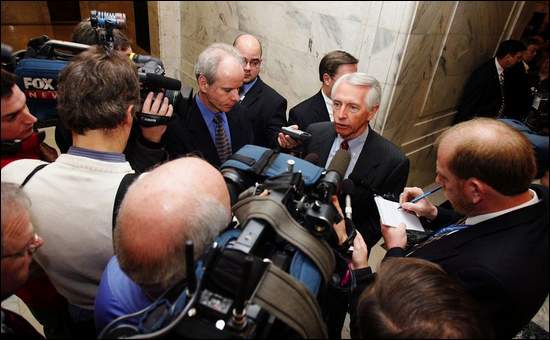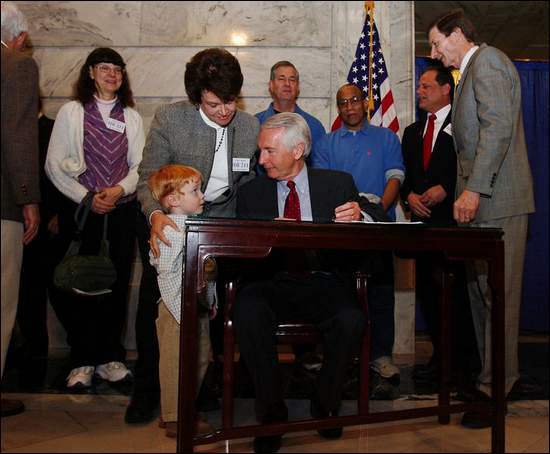Offenders to Face Tougher Penalties
By Peter Smith
The Courier-Journal
April 15, 2008
http://www.courier-journal.com/apps/pbcs.dll/article?AID=/20080415/NEWS0101/804150391
FRANKFORT, Ky. — It had been six years since John Scott filed a lawsuit over the sexual abuse he suffered as a child and three years since the priest who abused him pleaded guilty.
So Scott, of Louisville, took quiet satisfaction yesterday when Gov. Steve Beshear signed into law a measure toughening the penalties for sexual abusers and those who fail to report them, the first legal reform in the state following the sex-abuse crisis in the Roman Catholic Church.
"I'm really glad," said Scott, who for the past several legislative sessions has advocated for stricter criminal laws on sexual abuse. "The kids and parents of Kentucky should be proud. They wanted this for a long time, and it's here."
 |
| Gov. Steve Beshear spoke with reporters outside the Capitol Rotunda after he signed House Bill 211 which will strengthen penalties against sex abusers and those who fail to report them. The bill was sponsored by Rep. Jim Wayne of Louisville. Photo by Sam Upshaw Jr. |
In a signing ceremony in the Capitol Rotunda, Beshear said: "Over the last decade, we have all been outraged and horrified by the revelation of wretched and sometimes avoidable sexual crimes by those in positions of power in religious and education institutions.
"Today we hear and answer the voices of the victims of those crimes," Beshear said.
House Bill 211 — which passed both houses without dissent earlier this year — takes effect 90 days from the end of the legislative session, scheduled for today.
Since 2003, Roman Catholic dioceses and religious orders in Kentucky have agreed to pay a total of more than $100 million to more than 500 people in lawsuits over sexual abuse by priests and others associated with the church.
The cases revealed multiple instances in which bishops kept known abusers in ministry without warning parishioners.
"Perhaps no institution has desecrated its sacred trust of our youth more than the Catholic Church in America during the last 70 years," the Rev. Joseph Fowler, a retired priest in the Archdiocese of Louisville, said during the ceremony.
He applauded the victims and activists in the group Voice of the Faithful for promoting the legislation.
 |
| Gov. Steve Beshear chatted with Zach Whelan, 3, and his grandmother, Shannon Whelan, after signing the bill. It is the first legal reform since the sex-abuse crisis in the Roman Catholic Church. |
"Today is a day of joy for a lot of people who have put a lot of work into this," said the bill's sponsor, Rep. Jim Wayne, D-Louisville.
Still, abuse survivor Tom Weiter, also of Louisville, said advocates have more work to do to keep perpetrators in prison longer.
Like Scott, Weiter was abused by the Rev. Edwin Scherzer, who is serving house arrest for abusing them and two other boys in the 1950s and 1960s.
Weiter said that when perpetrators are released, he believes the rate of new offenses is so high "they need to be under some kind of supervision for the rest of their lives."
The bill makes virtually all types of sexual offenses against minors felonies, which means they carry tougher penalties and can be legally prosecuted whenever the victim comes forward. Advocates say it often takes victims many years to do so.
The bill signed yesterday:
Makes it a felony for anyone older than age 21 to subject a minor younger than 16 to sexual contact or engage in masturbation in the minor's presence.
Makes it a felony for a person in "a position of authority or special trust" to engage in such acts with anyone younger than 18. Such persons could include teachers, clergy, coaches, adult relatives and other such categories.
Establishes progressively steeper penalties for any citizen who fails to report the abuse or neglect of a minor. The first offense could bring a sentence of up to 89 days of incarceration, the second up to 12 months and any subsequent offenses up to five years.
Lengthens the statute of limitations for prosecuting the few remaining sexual-abuse crimes that remain misdemeanors, those involving alleged perpetrators younger than 21. The new law allows victims to bring charges within five years of turning 18, rather than one year.
Reporter Peter Smith can be reached at (502) 582-4469.
Any original material on these pages is copyright © BishopAccountability.org 2004. Reproduce freely with attribution.